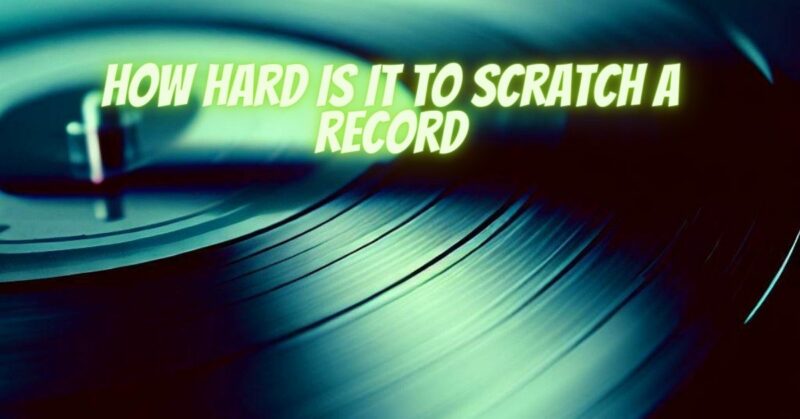Vinyl records have long been cherished for their warm and nostalgic sound, but their vulnerability to scratches has always been a concern for collectors and enthusiasts. The fear of damaging a beloved record can be daunting, leading many to wonder just how hard it is to scratch a vinyl record. In this article, we will explore the resilience of vinyl records, the factors that contribute to scratching, and practical tips to avoid damaging your cherished vinyl collection.
Vinyl Records and Durability:
Vinyl records are made of polyvinyl chloride (PVC), a type of plastic known for its durability and stability. When properly handled and cared for, vinyl records can withstand numerous plays without significant wear or damage. However, they are not indestructible, and care must be taken to preserve their condition.
Factors that Contribute to Scratching:
- Stylus Quality: The stylus (needle) is a critical component in the record playback process. A high-quality stylus in good condition will glide smoothly along the grooves and minimize the risk of scratching. Conversely, a worn-out or damaged stylus can dig too deep into the grooves and cause scratches.
- Turntable Setup: Proper turntable setup is essential to ensure accurate tracking and minimize the risk of scratching. Correct tracking force and anti-skate settings help maintain the right balance between ensuring good contact with the grooves and preventing excessive pressure.
- Record Handling: Mishandling records is one of the most common causes of scratches. Avoid touching the grooves and always handle records by their edges. Never stack records on top of each other without protective sleeves.
- Dust and Debris: Dust, dirt, and debris can act as abrasive particles, causing scratches during playback. Regularly cleaning records and using anti-static brushes can help reduce the risk of scratching.
- Storage: Proper storage is crucial to prevent damage to records. Store records vertically in protective sleeves to avoid contact with other records or surfaces that could cause scratches.
How Hard is it to Scratch a Vinyl Record?
Scratching a vinyl record usually requires a certain level of force or improper handling. Minor surface imperfections or hairline scratches may occur from normal use and will generally not impact sound quality significantly. However, deep and severe scratches that penetrate the grooves can cause audible distortion, skipping, and permanent audio defects.
It’s essential to exercise caution and care when handling and playing vinyl records. Scratches are often preventable with proper record maintenance and turntable setup. Regularly inspecting your stylus for signs of wear and cleaning your records can help preserve their condition and minimize the risk of scratching.
While vinyl records are generally durable, they are not immune to scratching. Scratches can occur due to mishandling, improper turntable setup, or dust and debris. However, with proper care and maintenance, scratching can be minimized, and your cherished vinyl collection can provide countless hours of enjoyable listening without significant wear or damage. Remember to handle records with care, use a high-quality stylus, and keep your records clean and properly stored. By taking these precautions, you can enjoy your vinyl records for years to come without the worry of unnecessary scratching.

